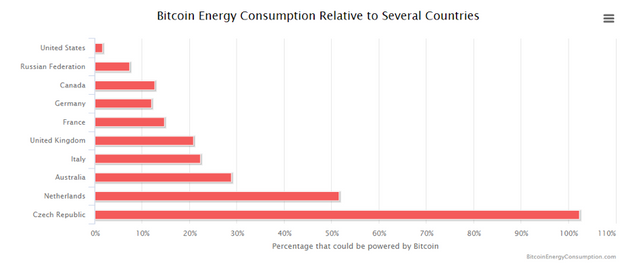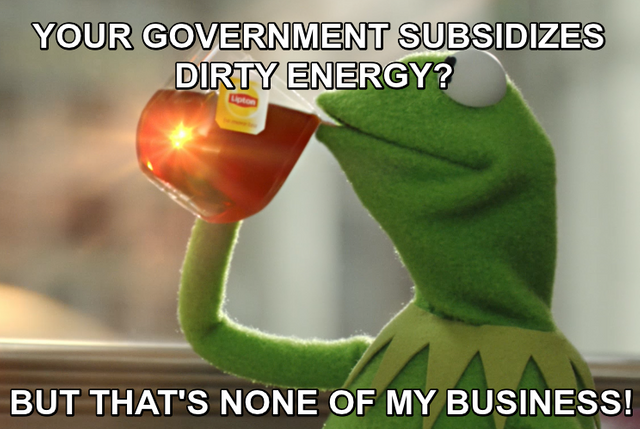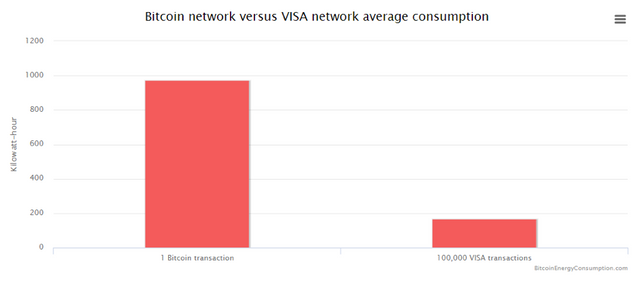Bitcoin mining and its energy consumption have always been a grateful journalistic theme. With an increase in hashrate in recent months, it is growing into alarming calls for strenuous steps against it. How much energy is actually consumed? And can we compare Bitcoin’s consumption to Visa or MasterCard?
Articles on the consumption of Bitcoin mining are an interesting phenomenon – we can see, for example, a crazy claim that "in 2020 the Bitcoin is going to need all the energy of the world". My personal theory is that by denigrating Bitcoin through “immoral” consumption, the journalists and their readers just cure their complex of not joining the Bitcoin train in time.

Bitcoin has consumption like the whole Czech Republic!
Let’s take a look at the merit of the statements speaking about the high share of Bitcoin mining in global electricity consumption. These are based mostly on the Bitcoin Energy Consumption Index (BECI) from the Digiconomist blog by Alex de Vries; the same author has also recently published Bitcoin’s Growing Energy Problem. This study has brought a new wave of articles about the disaster, as de Vries says that Bitcoin mining will consume 0.5% of the world’s electricity at the end of 2018 and in the future, it will be much more.
The BECI index calculates the consumption of Bitcoin mining by a relatively simple method: because we know the average earnings from mining, we can, with several variables, deduce the average consumption of electricity. The variables are estimated in this case and are made from the electricity costs (direct mining + cooling costs, etc.) and the average electricity price per kWh.
De Vries estimates that 60% of the mining revenues go for the electricity costs and the electricity price is, on average, 5 cents per KWh. For an unknown reason, de Vries counts the Bitcoin’s and also Bitcoin Cash’s revenues together.
From these assumptions, de Vries then calculates global electricity consumption for Bitcoin mining and offers journalistically grateful visualizations such as this one:

The main message of de Vries’ analysis (which was gratefully accepted by sensational journalists) is that Bitcoin represents an environmental disaster. The extrapolation of de Vries’ numbers then leads to nonsense claims about the absorption of x% of world electricity by Bitcoin mining.
De Vries’ methodology, however, also has a deep criticism, especially from blogger Marco Bevand. As Bevand points out, de Vries’ assumption that miners spend 60% of earnings on their electricity consumption is simply overestimated. De Vries considers that the market is perfectly competitive and, in the long run, the miners achieve zero operating profit (the marginal cost is equal to the marginal revenue). But that is absurd – because of the fact that ASIC devices are almost unavailable on the market and new batches are being sold out immediately. Why would the miners buy ASICs so quickly if they didn’t have a realistic view of positive returns?
De Vries is using too much a textbook approach, as he is, in his study, telling us: “We know that not even Bitmain is capable to generate profit in equilibrium.” While the textbook’s equilibrium denies the profit of Bitmain, Bitmain has – in fact – earned a profit of 3-4 billion dollars.
The results of an academic paper with unrealistic assumptions should simply not be interpreted as a reality by journalists.
Therefore, Bevand offers a much more conservative estimate of costs to revenue ratio which is further reduced with newer generations of ASICs – 39% for Antminer S5 and 12% for Antminer S9.
The total electricity consumption should then be much lower.
Bitcoin and dirty electricity
Well, different methodologies produce different results, and reality is probably quite different from scenarios speaking about an approaching energy apocalypse. What we can approve is the fact that absolute electricity consumption by bitcoin mining has increased over the years as the BTC price has a long-term upward trend and attracts more people to open large mining operations – in Australia, for example, a coal-fired power plant with a giant mining farm will be introduced during this year.
And the coal-fired power plants are supposedly the biggest problem. A huge portion of bitcoins is being mined in China with the help of coal-fired power plants, which would otherwise be used just by a fraction of capacity (because they were built to meet the communist five-year plan, not to satisfy the market need).
China massively subsidizes electricity from coal. Bitcoin miners profit because of this and they are converting cheap energy into valuable Bitcoins by securing the blockchain. In short, they use cheap inputs to produce more valuable outputs. That is a standard business behavior. Why should we blame “bitcoin makers” for doing such activities, and not car makers? Support for the energy sector is a decision of the Chinese Government; not Bitcoin miners. They only adapt to given conditions, as do entrepreneurs in other sectors.
 The Bitcoin Miner captured drinking the afternoon tea.
The Bitcoin Miner captured drinking the afternoon tea.But as the Chinese government has caused this problem, it will probably solve it by itself, too. Its representatives more and more often say that mining will not have so favorable conditions in the future as it has right now. The ban on mining is possible to be there, Bitmain even plans to reorient to AI calculations.
As a result, miners move to other countries with a more favorable business environment, which can also offer other benefits, such as cheap electricity from renewable sources and cold climate. It has recently been talked about Canada and Iceland. In both countries, renewable energy sources (water and geothermal) make up most of the electricity production.
Utilizing the waste heat generated by mining equipment is also evolving. Large mining operations begin to integrate businesses such as wood and fruit driers.
By moving to a cooler environment and also by using the waste heat, a large part of the cooling costs is reduced.
Bitcoin vs. fiat and banks – what consumes more?
Finally, let’s take a look at the popular comparison of transaction costs of Bitcoin and Visa. Again, we borrow one alarming chart from de Vries:

De Vries compares the average consumption of one Bitcoin tx vs. 100,000 Visa transactions. Of course, this is an absurd comparison, at least for two reasons:
Bitcoin is a full-fledged global payment system, while Visa is just one pillar of the fiat money system. While the Bitcoin network generates more units of BTC and creates “monetary policy” (nodes, mining), keeps records of ownership (blockchain), makes and enforces rules (BIPs, nodes) and settles transactions (nodes, mining), Visa only does the last thing. In short, these two systems are incomparable. On the right side, we would have to include the world’s central banks, loads of commercial banks, the army of officials and employees, thousands of heated buildings and air-conditioned datacenters, printers – and then we could make a more realistic comparison.
The average cost per transaction is a misleading indicator and leads to wild extrapolations in the style of “when people start to use it, it will consume half of the world’s electricity”. Bitcoin mining, however, works in the “all or nothing” way. As long as the system exists and somebody will be mining, transactions will be confirmed at the same rate as the system is internally regulated to produce a block every ten minutes. A higher number of bitcoin transactions does not implicate more consumed energy. On the contrary, with the Lightning Network, we can expect much higher transaction capacity, regardless of the dedicated computing power.
It should be noted that the main advantage of decentralized, non-state money is not and was never meant to be the energy efficiency. It is possible that Bitcoin would - after including all the costs of fiat money - consume more (although there is a reason to doubt about it when looking at the wealthy residences of central and commercial banks).
Bitcoin’s “killer app” is the security and the ability to transfer any value to anyone and anytime. As Bitcoin developer Peter Todd says, Bitcoin is primarily security software. And security is not a cheap thing; although its providers are still looking for more sophisticated ways to further reduce its costs (and possibly the environmental impact).

Great post. Resteemed it. I have always wanted to see a detailed analysis of how this estimate for energy consumed to mine bitcoin, came into existence and does it make sense. Today again BIS published some shit about it and the fact that it will break the internet. I have resteemed your post so that more people can see through the BS.
Downvoting a post can decrease pending rewards and make it less visible. Common reasons:
Submit
Thank you very much for your support. ;)
Downvoting a post can decrease pending rewards and make it less visible. Common reasons:
Submit
Good
Downvoting a post can decrease pending rewards and make it less visible. Common reasons:
Submit
A great post! Another factor to consider if bitcoin is used as a replacement to gold as a store of value, is the amount of energy and environmental degradation associated with the mining of gold ores. Bitcoin as gold 2.0 would completely alleviate this cost.
Downvoting a post can decrease pending rewards and make it less visible. Common reasons:
Submit
We need to use green energy and should think upon minor energy consumption machines
Downvoting a post can decrease pending rewards and make it less visible. Common reasons:
Submit
The miners (as they try to have the biggest profit) are looking for the cheapest electricity available. So if the state does not influence the market through subsidies (or other interventions), miners are forced to use the green energy because it is much cheaper. In the free market, it is definitely less profitable to mine with dirty energy. As it is mentioned in the article, every entrepreneur have to produce more valuable outputs from less valuable inputs, thus if the dirty energy is not subsidized, its users pay more for electricity (in most cases).
Downvoting a post can decrease pending rewards and make it less visible. Common reasons:
Submit
I think the prices of the green energy equipments will be falling down. as it is coming in daily use by various firms like google Facebook Microsoft etc. and even many govt offices in African countries are green energy powered. Even in USA yu can see a vital use of green energy
Downvoting a post can decrease pending rewards and make it less visible. Common reasons:
Submit
interesante gracias por compartir
Downvoting a post can decrease pending rewards and make it less visible. Common reasons:
Submit
Nano will solve the problem, is the future.
Downvoting a post can decrease pending rewards and make it less visible. Common reasons:
Submit
The article says that this is not a huge problem. If you have a serious problem with every "unnecesary" electricity consumption, you are already on platform that has minimal energy costs for running the blockchain.
The LN built on Bitcoin is already capable to handle much more transactions than VISA can (well, it depends who is a sender and who is a receiver... theoretically, you can make unlimited number of transactions within one channel instantly... it just depends on your PC).
So that's why I think that the problem is already solved although I am a big fan of every effort to improve cryptos. I have seen several reactions on NANO that it is a nonsense, shitcoin and so on... but I actually don't know a lot about it so I just wish you a good luck with your NANO hodlings. :)
Downvoting a post can decrease pending rewards and make it less visible. Common reasons:
Submit
You got a 24.48% upvote from @upmewhale courtesy of @samotonakatoshi!
Earn 100% earning payout by delegating SP to @upmewhale. Visit http://www.upmewhale.com for details!
Downvoting a post can decrease pending rewards and make it less visible. Common reasons:
Submit
Congratulations! This post has been upvoted from the communal account, @minnowsupport, by samotonakatoshi from the Minnow Support Project. It's a witness project run by aggroed, ausbitbank, teamsteem, theprophet0, someguy123, neoxian, followbtcnews, and netuoso. The goal is to help Steemit grow by supporting Minnows. Please find us at the Peace, Abundance, and Liberty Network (PALnet) Discord Channel. It's a completely public and open space to all members of the Steemit community who voluntarily choose to be there.
If you would like to delegate to the Minnow Support Project you can do so by clicking on the following links: 50SP, 100SP, 250SP, 500SP, 1000SP, 5000SP.
Be sure to leave at least 50SP undelegated on your account.
Downvoting a post can decrease pending rewards and make it less visible. Common reasons:
Submit
You have recieved a free upvote from minnowpond, Send 0.1 -> 2 SBD with your post url as the memo to recieve an upvote from up to 100 accounts!
Downvoting a post can decrease pending rewards and make it less visible. Common reasons:
Submit
You got a 12.42% upvote from @postpromoter courtesy of @samotonakatoshi!
Want to promote your posts too? Check out the Steem Bot Tracker website for more info. If you would like to support the development of @postpromoter and the bot tracker please vote for @yabapmatt for witness!
Downvoting a post can decrease pending rewards and make it less visible. Common reasons:
Submit
Sneaky Ninja Attack! You have just been defended with a 33.76% upvote!
I was summoned by @samotonakatoshi. I have done their bidding and now I will vanish...
woosh
A portion of the proceeds from your bid was used in support of youarehope and tarc.
Abuse Policy
Rules
How to use Sneaky Ninja
How it works
Victim of grumpycat?
Downvoting a post can decrease pending rewards and make it less visible. Common reasons:
Submit